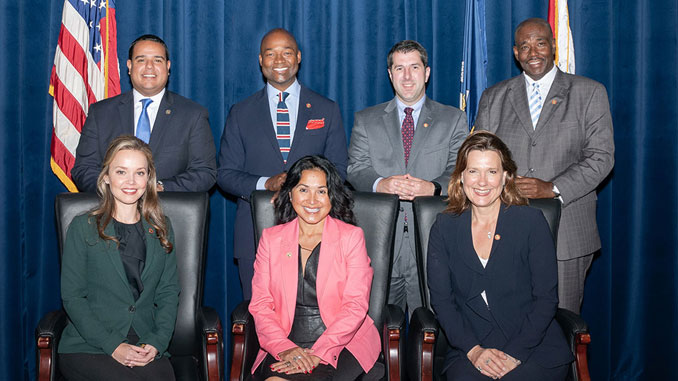
City of New Orleans
NEW ORLEANS – After several weeks of budget hearings, the Council adopted the City’s 2020 Operating and Capital Budgets, concluding the Annual Budget Review Process and establishing spending levels for the coming year. Prior to the meeting, the City held a special Revenue Estimating Conference to adopt an adjusted 2020 revenue forecast and capture newly identified sources of revenue.
Since October 17, when Mayor LaToya Cantrell appeared before the Council to present a proposed $721.9 million Annual Operating Budget from the City’s general fund, the Council has held a rigorous budget review process to learn the needs of each department and listen to residents’ concerns. As a result of the budget revenue process, the Council adopted an amended operating budget totaling $725.9 million, which represents an increase of $4 million.
“Today is a historic one for the City of New Orleans and our children. We’re setting an unprecedentedly high bar for the State of Louisiana and the entire country with this incredible investment in our young people. We’ve gone from $750,000 two years ago, to $1.5 million in 2018, to an unprecedented $3 million for early childhood education in 2020. I’m extremely grateful to my colleagues, the Administration, and my staff for the months of hard work that went into this budget. Our future and that of our children, has never been brighter,” said District “D” Councilmember and Budget Chair Jared Brossett.
2020 Budget highlights include funding for the following:
• Early Childhood Education programs to expand access to quality early childcare and education in New Orleans (doubling funding by $1.5M to bring the allocation to $3M)
• Total Community Action to purchase a food pantry freezer to store food provides low-income vulnerable individuals/families with food supplements ($8,000)
• Demolition of the blighted Higgins Gate apartment complex ($800,000)
• Algiers Water Management Study ($250,000)
• Code Enforcement to address quality of life needs and eliminate blight ($700,000)
• Department of Health for mobile decibel monitors to address noise concerns ($45,000)
• Department of Health for a Domestic Violence Initiative ($250,000)
“I’m very pleased with the collaboration of the budget process,” said Councilmember-At-Large Helena Moreno. “My colleagues and I on this Council have been laser-focused on making New Orleans a more affordable city to live in since we began in 2018. Today, the Council followed through by lowering – not raising – property taxes at a time when assessments are skyrocketing and potentially forcing long term homeowners out of their neighborhoods. The Council also made clear its priorities: infrastructure and public safety. I’m also proud that we once again doubled funding for early childhood education and allocated specific funding for domestic violence initiatives.”
Throughout this year’s budget hearings, Councilmember Brossett led a negotiation process with the Mayor’s Administration to ensure critical initiatives and services are funded while minimizing the burden on our residents’ tax bills. Given that the 2020 tax year is a quadrennial reassessment year, there has been considerable discussion regarding the reassessment process and the rising property tax assessments that resulted, leading to heightened concern among residents about their tax bills and the effect a potential roll forward could have on that bill.
In a reassessment year, the Council may roll forward millages up to the maximum authorized rates. Recognizing the concerns of residents, Councilmember Brossett ensured the redirection of certain millages to fund public safety and infrastructure while reducing (rolling back) other millages during the negotiation process with the Administration. This redirection of millages allows the Council to ensure critical initiatives and services are funded while remaining revenue-neutral.
Key millages being funded:
• New Orleans Police Department (NOPD) & Fire Department (NOFD)
• Sewerage & Water Board (S&WB)
• City Alimony
• Neighborhood Housing Improvement Fund (NHIF)
Certain millages being levied below the rollback millage rate:
• Economic Development Fund
• Capital Improvement Fund
• Audubon Park
• New Orleans Public Library
“This budget is a true collaboration of the Administration and the Council to improve critical services that our City values and expects. We worked diligently to approve a budget that shows our shared priorities such as public safety, infrastructure, quality of life, economic development, and most importantly, the children of this City. I applaud everyone involved for a continued focus of providing better education outcomes for New Orleans’ most vulnerable children by funding early childhood education, investing in our fire and police departments to ensure they have the resources to better serve our citizens, and securing much-needed monies to finally clean up, Higgins Gate, a huge blighted property in Algiers which I hope will spur new development on the West Bank.” said District “C” Councilmember Kristin Gisleson Palmer.
“Today, we protected funding for vital public services in a smart way,” said District “A” Councilmember Joe Giarrusso. “Government’s first job is to provide those public services responsibly. This deal between the Mayor and Council concentrates on the quality of life issues with spending for first responders, streets, drainage, maintenance, and other fundamental needs.”
Recommended For You.



Be the first to comment